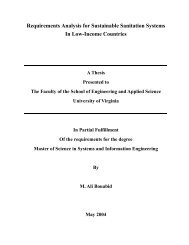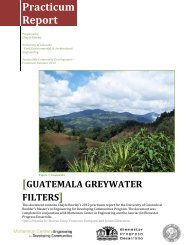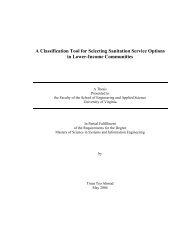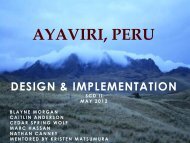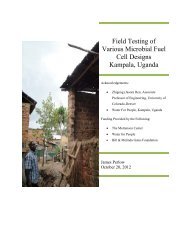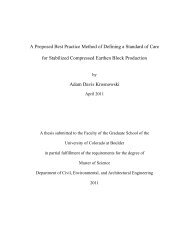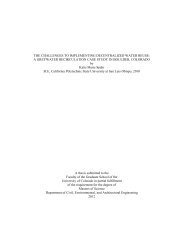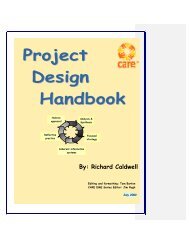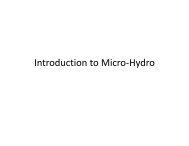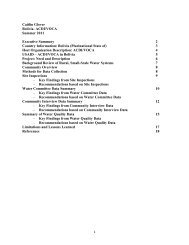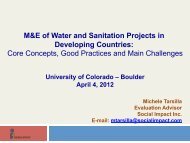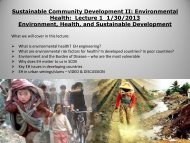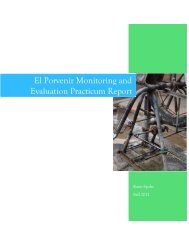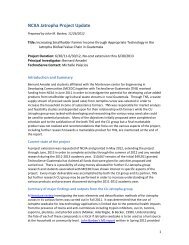Issuance Date 19 August 2011 Contract Number AID-617-C-10 ...
Issuance Date 19 August 2011 Contract Number AID-617-C-10 ...
Issuance Date 19 August 2011 Contract Number AID-617-C-10 ...
Create successful ePaper yourself
Turn your PDF publications into a flip-book with our unique Google optimized e-Paper software.
WUC Evaluation – Preliminary Results <strong>2011</strong><br />
the Information Technology and Management Advisor for CWI provided valuable insight into<br />
potential challenges that NUDEIL WUCs may face in the future. The complete interview<br />
transcript can be found in Appendix G.<br />
According to the Country Director, Emmanuel Ojara Sunday, general upkeep of the area<br />
surrounding the BHs have been kept. However, contributions and routine maintenance varied.<br />
In some cases communities only contributed when something broke. Some communities were<br />
not performing routine maintenance due to a lack of access to the necessary tools. According to<br />
Mr. Sunday this tool would be a spanner which would cost around 25,000 UGX. A complete<br />
tool set would be 800,000 UGX.<br />
The main reasons for an unsuccessful WUC were primarily a lack of motivation of the<br />
community in general or a lack of trust between the WUC and the community. Mr. Sunday<br />
described that in some instances communities begin to feel frustrated with the by-laws that are<br />
created and enforced by the WUCs.<br />
CWI focuses on three main topics during their rehabilitation trainings: maintenance,<br />
responsibility, and finance/budget (please see Appendix G for a complete description). They<br />
also have a detailed follow-up plan for each community that could last for up to a year and a half.<br />
Some of the advice that CWI had for NUDEIL WUCs were:<br />
Emphasize actual practice (familiarity with water point in the IDP camps means that<br />
people will be able to tell you what you want to hear).<br />
Ensure there is an upfront commitment form the community before drilling begins. One<br />
suggestion was to have the communities collect x amount of funds before the start of<br />
drilling that can be used to open a bank account. This would not only create a sense of<br />
ownership but also helps dispel some of the culture learned in the camps (not everything<br />
is given for free).<br />
If lunch is provided during trainings, hire someone from the community to cook<br />
something local (rice and beans). This not only generates income for the community but<br />
also helps to dispel the “given for free” culture.<br />
o Another suggestion was to not provide sodas since people might have a lot of<br />
energy at first (hard to focus) and then crash (too tired to focus).<br />
Ensure an open line of communication. Let the community know exactly what is going<br />
on. If water is not found, explain why. If a training has to be canceled or rescheduled,<br />
explain why.<br />
When asked if CWI would like to see any changes with the districts, the following suggestions<br />
were made:<br />
The district should have a certifying organization that can visit each water point to ensure<br />
certain bench marks are met (x amount of funds have been collected, etc) before a BH<br />
is drilled.<br />
The district should update their records (number of and contacts for pump mechanics,<br />
number of formed and functioning WUCs, number of non-functioning WUCs, etc)<br />
More funds should be allocated to rehabilitations instead of new BHs.<br />
16



